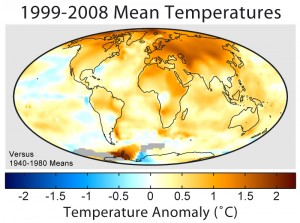Climate Change in Arizona – The Economic Impact Of Climate Change On Arizona Citizens
 Arizona residents are well familiar with the blunt-force temperatures of climate change. But now the economic consequences are also mounting. Join American Cooling and Heating in this brief overview of global warming cost-and-effect in Arizona.
Arizona residents are well familiar with the blunt-force temperatures of climate change. But now the economic consequences are also mounting. Join American Cooling and Heating in this brief overview of global warming cost-and-effect in Arizona.
“Even as politicians argue the validity of global warming, the economic burden of laws designed to reduce and control human-triggered climate change wrap heavy hands around the livelihood of citizens in Arizona and other regions of the Southwest U.S.,” local spokesperson for ACH in Arizona.
Managing Global Warming, Climate Change and the Economic Fallout
After enduring over a decade of year-by-year temperature increases averaging nearly two degrees Fahrenheit, Arizona residents don’t tend to argue the validity of global warming or the reality of undesirable climate change. The heat is here. This South-western state has experienced the highest brute-force temperature change of any of the lower 48 states in the U.S. Long-term heat increases seem a permanent complication. Recent studies indicate that by 2050 Arizona citizens can expect to see regional temperatures climb by another three to five degrees.
So why do the residents of this fine state resist the industrial changes that can help reduce the problem?
Fixing global warming requires economic sacrifice. In a nation already struggling against a fragile economy, such sacrifice seems unreasonable. Surrendering daily bread in exchange for resolving long-term climate change seems a sour tradeoff. According to the senior vice president of communications at the American Coalition for Clean Coal Electricity, Laura Sheehan, issues pertaining to climate change should be taking a back seat to current economic demands (1). Too many people perceive Obama’s climate change agenda as political rather than essential. Real issues are at state. Across the country, families are struggling to pay bills, meet necessary health care conditions, and provide for a bit of comfort in a troubled world.
But restraint is not the only mindset. According to Frances Beinecke from the Natural Resources Defense Council, acting now to eliminate human-triggered climate change will help the economy by providing new jobs, lower cooling costs, and a healthier environment. Yet for most people, fixing global warming should not be in the Top 10 list of national priorities. Climate change is an issue to be addressed, but one look at what is going on in Arizona reveals an unacceptable measure of economic sacrifice.
Commissioned regulations crafted to ensure a reduction in the emission of greenhouse gases are already in effect. And they are promoting increased economic burdens on all local industries, including the agricultural industry, an industry of primary strength in the American Southwest. With a March 2014 unemployment rate of 7.3, Arizona hangs with the top eight highest levels of unemployed in the nation (2). Laws that burden industry with additional expenses hinder employment opportunities.
Arizona residents are prodding government agencies to fix the current problems rather than the long-term human-triggered climate change issues. For families already suffering due to new regulations associated with fixing global warming, the demand is that Arizona leaders establish laws that successfully reduce the impact of human-triggered climate change without trashing the economic stability of the affected regions.
Climate Change in Arizona – Obvious But Not So Important As Having a Job
Economic prosperity requires progressive growth. Yet urban expansion generates higher urban heat tables. In recent years, the nighttime temperatures in Arizona have exceeded those of the adjoining states by as great an increase as 10 degrees. However, the laws designed to correct global warming increase business operating costs and hinder progress. The Arizona economy suffers the fallout. Businesses go under. Locals lose jobs. And families pay the higher cost for controlling local human-triggered climate change.
Throughout the Southwest:
- Summertime grows hotter
- Above normal high temperatures has become the normal
- 90 degree-plus nighttime temperatures are on the increase
- The local water table is decreasing
- Water pollution is on the increase
- Fire, dust and dry land shadow daily life
- Local precipitation has decreased
- According to scientific predictions: By the mid-century, Arizona will suffer a 40-percent decrease in usable water.
Reports from the Sandia National Laboratories (SNL) indicate that the decrease in local precipitation will affect growth in all major local industry sectors including:
- Agriculture
- Mining
- Utilities
- AND more.
The consequences of accumulated industrial losses will affect consumer incomes, consumer spending and population growth throughout state. According to the SNL economic study, Arizona lingers as one of the most vulnerable states in the nation. With regional agriculture and ranching industries already struggling for survival, the cost of the economic fallout on marginalized farmers may be too great to withstand.
It’s not yet a panic situation, but for most Arizona residents the necessity to deal with the immediate economic problems far outweighs any need for correcting long-term global warming issues. Arizona local, state and federal agencies need to equalize the cost structure and establish an economically practical resolution to the effects of global warming.
From more information on climate change, click here.
Disclaimer: This article and its content do not constitute legal, financial, technical, or medical advice. While every reasonable effort has been made to ensure that this document is correct at the time of publication, the company and its employees and agents disclaim any and all liability to any person in respect of anything or the consequences of anything done or omitted to be done in reliance upon the whole or any part of this article and its content. All trademarks, logos, and associated content displayed are the property of their respective owners.
2) http://www.bls.gov/web/laus/lauhsthl.htm
climate change, economy, global warming